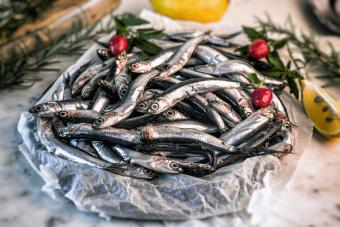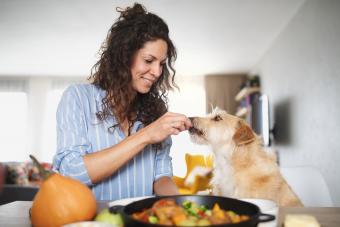
Bacon is overwhelmingly salty and contains a high level of fat. Eating significant amounts of bacon can also lead to serious health consequences. As a result, it's not labeled as being safe for your dog.

Bacon Doesn't Have Nutritional Benefits for Your Dog
Bacon is basically salt-cured pork that is intended to be fried. A single slice of bacon has a lot of calories, as well as fat and protein in equal amounts. Also, they contain no carbohydrates or fiber, as well as little to no additional vitamins and minerals. There's almost no nutritional value to providing bacon to your dog.
Bacon Can Lead to Health Issues
If you drop a piece of bacon, there's likely no need for concern. However, offering bacon more frequently as a treat or on a regular basis can cause stomach upset or even pancreatitis. The fat found in bacon is one primary concern. Bacon is generally cooked in a frying pan, adding to the fat content. Dogs need fat for energy, but only healthy fats. The fat found in bacon is not one of these.
Pancreatitis is a health condition where the pancreas becomes inflamed. Pancreatitis can lead to pain, fever, and diarrhea, among other symptoms.
Bacon's high salt concentration can cause your dog to consume a lot of water in a short period of time, potentially leading to bloat. Nitrates can also be found in bacon. Because nitrates are a type of salt, bacon has a high sodium content. While your dog requires some salt in their diet, too much can make them sick, causing dehydration or even sodium overdose.
When it's cooked, it also forms compounds known as heterocyclic amines, which are known carcinogens (cancer-causing compounds). Studies have found that bacon contains higher levels of carcinogens than any other meat source.
Raw bacon might also make your dog susceptible to parasites like trichinosis.
Dogs and Bacon Grease
Like bacon itself, your dog shouldn't consume bacon grease. It's oily, high in fat, and heavy on the stomach. Bacon grease is quite likely to irritate your dog's stomach and cause digestive issues. If your dog has an underlying health problem, it's particularly important to avoid not only bacon, but the bacon grease, as well. Keep it out of reach.
When to See a Veterinarian
If your dog eats bacon and experiences any of the following, it's time to visit the veterinarian.
- Vomiting
- Diarrhea
- Appetite loss
- Lethargy
- Pain
- Muscle stiffness or apparent soreness
Bacon Alternatives
Rather than feeding your dog bacon, you can offer:

- Boneless, skinless, plain bite-sized pieces of chicken
- Bite-sized portions of salmon
- Fresh anchovies (or anchovies in water -- do not provide anchovies canned in oil)
Bacon Isn't a Safe Treat for Dogs
Bacon isn't recommended as a treat for your dog and feeding it can come with serious conseqeuences. If your dog consumes a significant amount of bacon, observe them closely and reach out to your veterinarian if you notice any symptoms. As a precaution, it's recommended to reach out before symptoms appear so your veterinarian is aware of a potential upcoming issue. This is particularly important in cases where dogs have an underlying health condition that may be affected.







